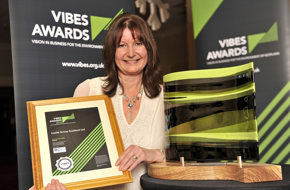Highlights
- The company’s carbon impact has fallen by 40% over five years, and it diverts over 90% of waste from landfill, significantly more than the industry average.
- Since its VIBES award, Castle Group has saved more than £5,600 and 10.5 tonnes of carbon dioxide equivalent by monitoring and reviewing the efficiency of its vehicle fleet, which transports team members to and from sites all over Scotland.

Based in Bellshill, North Lanarkshire, Castle Group Scotland is a construction industry contractor specialising in structural repair and maintenance in sectors including utilities, marine, defence, road, rail, and building.
The company has developed an environmental management system (EMS) based on the philosophy of ‘Giving the Past a Future’. This involves prioritising repair, restoration and refurbishment before contemplating rebuilding.
Part of Castle’s EMS is an emergency response plan for projects which may include protected species or habitats. There is also a process to identify recycling and reuse options for materials that could be diverted from landfill.
Castle Group has developed its environmental performance in three key areas: resource management, fleet fuel management and climate change adaptation and mitigation.
VIBES credentials
Castle Group Scotland won the ‘Management’ category for small and medium enterprises in the 2012 VIBES Awards.
Alan Ford, Director of Castle Group Scotland, said: “At Castle Group Scotland we now consider the implementation and progression of good environmental practices at the centre of our business.
The VIBES award and our previous success has enabled us to focus on the task at hand and has provided our team with a tangible result for all their hard work. It has also provided evidence of our environmental credentials and success in this area to all our clients and service providers.”
Environmental and business benefits
- The company’s carbon impact has fallen by 40% over five years, and it diverts over 90% of waste from landfill, significantly more than the industry average.
- In 2014, Castle Group worked with Resource Efficient Scotland (RES) – the business advisory programme delivered by Zero Waste Scotland – to develop better site waste management plans and potential material reuse strategies.
- “This has led to important circular economy benefits, including waste savings of £30,000 on our major structural refurbishment project at Aberdeen Music Hall,” explains Alan Ford, Director of Castle Group Scotland. The same project saw us reuse around 80 tonnes of rubble on site and save and donate 35 tonnes of wood to a local social enterprise for reuse as furniture.
- The same project saw Castle Group save and donate 35 tonnes of wood to a local social enterprise for reuse as furniture. The building’s lifts and hoists were donated to a production company. Around 80 tonnes of rubble on site was also reused.
- Other projects include repairs to the Victorian era Katrine Aqueduct, which takes water to treatment works that supply 1.3 million people in Glasgow and west central Scotland. By using robotic technology to break out and repair sections of concrete, Castle hopes to reduce material waste and the time workers need to spend in the tunnel space.
- Since its VIBES award, Castle Group has saved more than £5,600 and 10.5 tonnes of carbon dioxide equivalent by monitoring and reviewing the efficiency of its vehicle fleet, which transports team members to and from sites all over Scotland.
Wider benefits
- Environmentally sensitive projects have included a site at the Bridge of Dun in Angus that neighbours an area of special scientific interest and the Dumbarton Quay project, where tidal patterns had to be taken into account.
- Ongoing projects include exploring potential environmental savings from robotics and a site stock management tool designed to reduce excess material waste.
- Since 2012, Castle’s environmental management system has been enhanced to include procedures to assess flooding risk for projects
- When a flash flood stopped work on a bridge project due to high water levels, the project timeline had to be pushed back, causing financial implications for the business.
- Construction weather claims are usually costly and success is unlikely, but working with environmental consultancy Beyond Green, Castle was able to prove the river level and rainfall was unpredictable and abnormal in comparison to previous years.
- This involved using project data recorded in Castle’s environmental management system, alongside data from SEPA and SNHi (Scottish Natural Heritage’s data services)
- The evidence supported an adverse weather claim, resulting in a full recovery of the losses. This process is now used to mitigate climate change risks for similar projects.
Website: http://www.castlegroupscotland.co.uk/